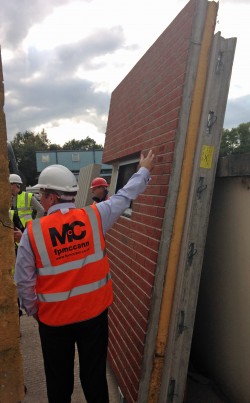As part of the Inside Offsite factory tour programme, precast concrete specialists FP McCann opened up its Byley manufacturing facility to showcase its key offsite technology and explain the ways precast concrete is contributing to a more efficient and effective built environment.
In 2015, FP McCann strengthened its structural and architectural precast concrete arm with the acquisition of Buchan Concrete Products, strengthening FP McCann’s role as one of the UK's leading construction materials and civil engineering companies. Its Byley site is now an important facet of its modular building network, generating a range of offsite products including its successful insulated precast sandwich panels.
Since absorbing Buchan Concrete Products, FP McCann has become a key operator in the design, manufacture and installation of many precast products including internal walls, floors and ceilings panels. With further capital investment in new machinery at both Byley and the Grantham operations planned, this is set to boost production levels and increase its structural precast building capacity, as both works seek to become even more automated and provide building elements for the pivotal education, hotels, apartments and custodial markets.
At the heart of the Byley operation are the architectural precast concrete insulated sandwich panels. These are clad either with a brick-facing or are acid-etched to bespoke design specification. Other architectural precast concrete products complementing the sandwich panels include lintels, columns, facades, soffits and balconies.
The insulated precast sandwich panels provide a ready-made external envelope with a variety of finishes. This eliminates many of the pitfalls associated with traditional building methods utilising ‘traditional’ techniques and employing site-intensive wet trades. The panels comprise an outer leaf of precast concrete, an insulating layer and a structural inner leaf of plain grey concrete that is power floated to a smooth internal finish. The external skin is connected to this and supported by the internal skin using proprietary plastic ties – these have a low thermal conductivity that eliminates potential cold bridging.
The thickness of the insulation can be modified in order to accommodate any required U-value. The shape, thickness and size of the concrete can also be made to meet the requirements of any project specifics and client requirements. In keeping with all offsite methods, insulated sandwich panels can be used to reduce erection periods by weeks and generally improve onsite safety. The ability to fit various facades, windows and insulation during manufacture also reduces the need for numerous follow-on trades and crucially often eliminates the need for scaffolding. The beauty of the precast systems is that the main load bearing structure is complete within weeks and protected from the weather.
Also in production is the precast crosswall structural system. This comprises of a series of concrete panels that form the entire building envelope with internal, structural load-bearing and partition walls, external walls and floor slabs. The external walls can consist of just the inner leaf concrete finish or include the insulated precast sandwich panels. Precast in vertical battery moulds, the wall panels can have openings for a range of fittings pre-cut and ‘cast in’ inside the factory, such as openings for smoke detectors – known to be an important fitting for prison schemes. Underfloor heating can also be factory-installed, then pressure-tested in the factory to ensure a reliable defect-free system. Window and door openings are pre-formed in the panels and service conduit channels can be added prior to installation showcasing the benefits of offsite thinking.
The Byley works is producing approximately 12-14 panels a day with 6-8 insulated sandwich panels a day. If planned for vertical construction the precast panels are always lifted vertically in the factory and stored vertically – likewise if meant for a final horizontal position. The panels are then cured for 28 days before final loading, transportation and installation. “We do believe offsite is the way forward,” says FP McCann’s Neil Magner. “Looking to the future, the hotel sector is really growing and we are seeing the insulated sandwich panels going into higher buildings. The exterior finishes are constantly evolving and with the windows factory-installed, it means we can deliver an efficient scaffold-free build. This is especially important with city centre projects where tight space requirements and tight timescales are often the case. These problems can both be solved using offsite methods.”
The use of FP McCann’s precast concrete system can be seen across a range of successful projects including the 330-bedroom Motel One in Manchester and present projects going through production at Byley include Keele University, a 453-bedroom student accommodation project being delivered by main contractor Seddon Construction.
Original Link - Offsite Magazine









